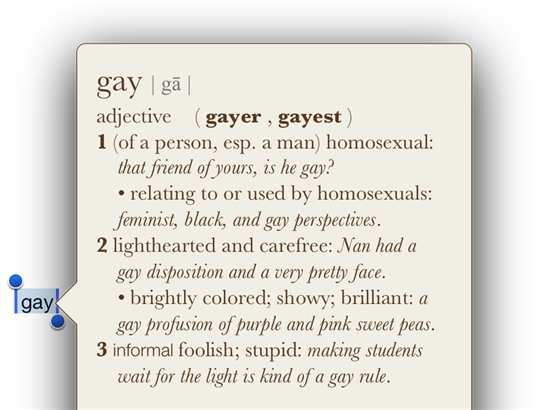Apple Inc. has been in the limelight for several days now
regarding its dictionary app. It appears that the app contains some definitions
that people may find offensive. The word “gay” is defined by the Apple
dictionary in iOS 6 with several different descriptions. One of the
descriptions is “foolish; stupid,” and this description is the one that has at
least one Apple customer riled up.
Who Wants A Bite Of Apple?
15 year old Becca Gorman is a tenth-grade student in
Sudbury, Massachusetts. Gorman is the daughter of lesbian parents, and because
of this is sensitive to slurs and discrimination based on sexual
preferences. She looked up the word “gay”
in her MacBook Pro, which has the dictionary app built in from the factory. The
definitions she found triggered an instant response of disgust.
The definition upset her so much that she wrote a letter to
Tim Cook, Apple’s CEO, who is openly gay. In the letter, she asked why Apple
allowed such a definition in its dictionary, when the company takes such a strong
stand on gay rights and equal treatment.
Part of the letter is included here:
I am asking for you to remove this definition from the
Dictionary you are promoting, or to make a significant change to it. I also
think it would be a good idea to apologize to the gay community, a good amount
of your customers. Thank you for your cooperation, I love your products.
Is Apple To Blame?
First of all, Apple did not write the dictionary, so asking
them to alter someone else’s work makes no sense whatsoever. To ask a company
that distributes a book (or e-Book) to alter that book just because you
disagree with something it says is asking them to change something they have no
right to change. Just because you may not agree with something does not make it
wrong. However, if you’re dead set that you must have your satisfaction in this
matter, then the company that wrote the dictionary should be your point of
contact, not the middle man who distributes it.
I understand that the young lady who wrote the letter to
Apple believes she is standing up for her moms’ rights as lesbians. I am in no
way tearing down her efforts to protect her family and friends. I do however,
believe the battles should be chosen a little more carefully, as this one is
simply disagreeing with fact.
Fact 1: People do use the word “gay” in the sense
mentioned in the dictionary app. Fact 2: Removing it from the app will not make
people use it any less – it simply hides the truth from others who might read
the definitions. Fact 3: Depriving people of truthful information regarding the
use of a word, even if that usage offends you, does not do anyone in the world
a service.
Look up any curse word you want in the dictionary app, and
note that its original usage is no longer what it is used for in common
conversation. However, if I write to Apple, Google, or even Webster’s and ask
them to remove the slang definitions I consider to be offensive, I would be
laughed at and publicly humiliated. Before we start asking people to change
definitions because they offend us, let’s ask instead that we not be so easily
offended by the truth.


